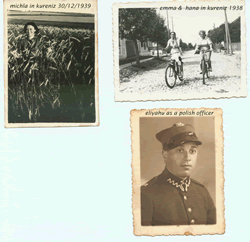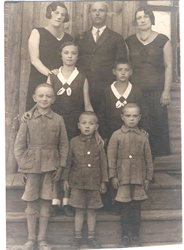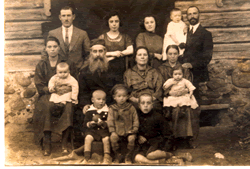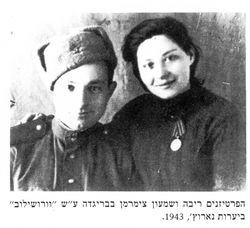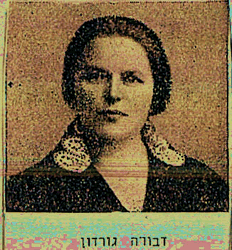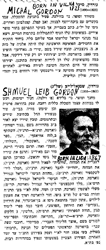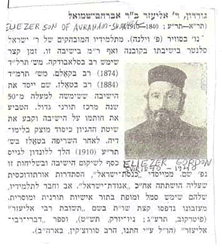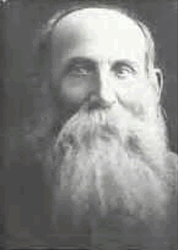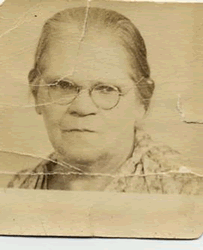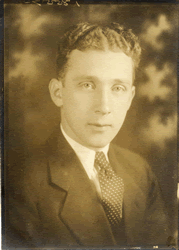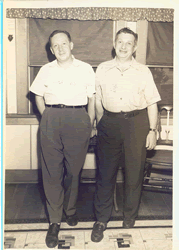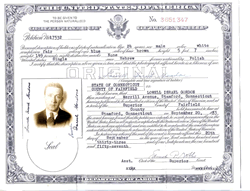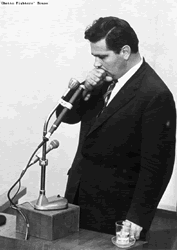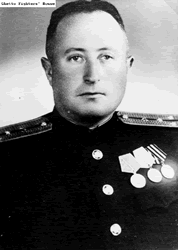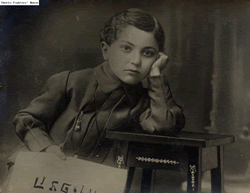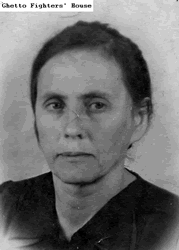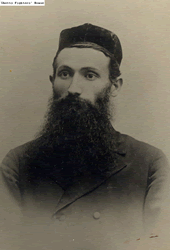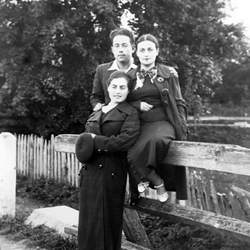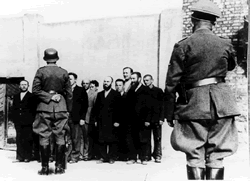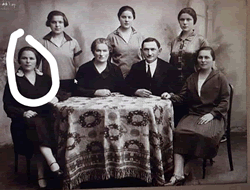Only two survived the holocaust. The two girls in the midle row; Riva nee Gordon (married Shimon Zimerman of the Kurenets Landmanshaften in Israel. for their story go to;
http://www.jewishgen.org/Yizkor/kurenets/kur315.html
Michla nee Gordon married the son of Alter Zimerman and lived in Israel.
The boys as well as their parents hid from the Germans but they were found and killed in Kurenets on 9- 9- 1942
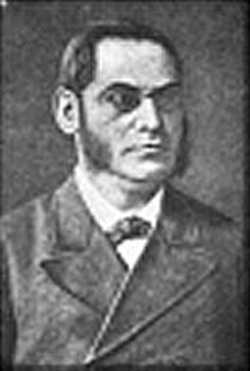
Poet, critic and journalist, a key spokesman of the Haskalah, Judah Leib Gordon was born in Vilna, and after a brilliant student career, became a teacher in various Jewish government schools. His first major poem -- The Love of David and Michal, an epic, was published in 1857, and was followed two years later by Mishlei Yehudah ("Judah's Parables"), translations and adaptations of works by Aesop. Phaedrus, La Fontaine, Lessing, and Krylov. While serving a prison term for alleged anti-Czarist activities, Gordon wrote Zidkiyyahu be- Veit ha-Pekuddot ("King Zedekiah in Prison" 1879), a historical biblical poem reflecting his prison experiences. On his release from prison Gordon became editor of the St. Petersburg Hebrew daily Ha-Meliz and also science editor of the Russian Jewish monthly Voskhod (1881--82). His poem Kozo shel Yod ("The Point on Top of the Yod") was a protest against the oppressed situation of Jewish women of the time. Gordon at first blamed the troubles that plagued Russian Jewry on the traditionalism of the rabbis. He urged Jews to stop speaking Yiddish, to participate more in Russian life. He advocated universal general education and the translation into Hebrew of all literature of general interest, denouncing those who opposed this as wishing "to drive out our Hebrew language from the land of the living." But Gordon's faith in the ability of Russian Jewry to adapt happily under Russian liberalism proved shortlived. After the 1881 pogroms in southern Russia he came to regard emigration to western Europe and America as the only solution to Jewish oppression. Although he actively upheld the Zionist cause, he believed that true redemption could come about only after "our spiritual deliverance."
Sources: The Jewish Agency for Israel and The World Zionist Organization.
I am interested in the Gordon family from Krasne. My father and all the family always said they came from Vilna but his papers said Krasne. His father was Reb Oizer HaKohain. His mother .Rochel nee Kunin (can't find any Kunins). My father was Israel, changed to Lowell Israel or Irwin here. His brother was Samuel, later Sidney. Dad had uncles Isaac, Max, Joseph?, and at least 2 aunts-Anna Plotnick and Hanna Maalla Kunin. They all ended up in Stamford, CT.
Gail
#gdn-14
Leslie Gordon testifying at the trial of Adolf Eichmann in the
District Court of Jerusalem
Laurie Gordon (chiwawa@sympatico.ca)
: Hi,
My now deceased father Leslie Gordon (Eichmann Trial witness) last name
was not really Gordon as he is listed here on this website. His last name was
Freedman (sp?). He changed his name to Gordon during the war as not to "sound
Jewish". The reason I mention this is in case anyone who is a Freedman may look
for him (me his daughter Laurette - Laurie) and never find him under Gordon.
Attorney General: I call Mr. Leslie Gordon. He was deported
from Budapest to Poland. He was one of the 1941 deportees
to Kamenets-Podolski, of whom we have heard; subsequently,
he returned to Budapest and saw the Accused. The witness at
present resides in Canada. He will testify in English.*
{*No grammatical corrections have been made in the evidence
given by the witness}
[The witness is sworn.]
Presiding Judge: What is your full name?
Witness: Leslie Gordon.
Attorney General: Mr. Gordon, do you now live in Canada?
Witness Gordon: I live in Canada, in Montreal.
Q. You were born in Budapest?
A. Yes.
Q. Your parents had come from Poland?
A. My father was born in Poland.
Q. Hence you were regarded as Polish citizens?
A. According to the Hungarian laws, we were Polish citizens.
Q. What happened to you in June 1941?
A. In June 1941, when the Nazi hordes overran Poland, we
heard rumours that the Polish citizens will be taken out of
Hungary.
Q. When you say the Germans occupied Poland, which part of
Poland do you mean?
A. That was the east part of Poland.
Q. If I may lead you with a few questions, Mr. Gordon. You
were interned by the Hungarian authorities?
A. Yes, we were interned by the Hungarian authorities.
Q. You were brought to the then Polish border?
A. Yes, we were taken first to the Budapest synagogue.
There we have been told that orders came from the Germans,
since the Hungarians had no authority over the German
occupied territory, and these orders came strictly from
Germany.
Q. What happened then?
A. We were taken from the synagogue next morning, to the
Hungarian rail station, where we have been placed in
passenger cars, and we have been taken to the border of
Koeroesmezoe.
Q. And to whom were you handed over at the border?
A. At Koeroesmezoe, we were handed over to the Hungarian
gendarmerie until overnight. But next morning, we were
loaded up on German trucks - clearly visible German licence
plates on them.
Q. Who drove these trucks, and who were the guards?
A. We could not see the drivers until we arrived to the
place where we have been taken, but then they turned out to
be Germans.
Q. What Germans?
A. SS.
Q. How did you recognize them as being SS men?
A. From the skeleton (skull) on their caps - `Totenkopf'.
Q. Where did the Germans take you to?
A. We were passing close by several small villages, and then
we were passing through Kolomea until we came to about two
or three miles - or kilometres - outside of Kolomea, where
we had been told: "Schweine-Juden, herunter!" (Jewish Pigs,
get down).
Q. So you got off?
A. Yes.
Q. Where did you go?
A. We got down. Some of our luggage was left in the trucks
- which we were not allowed to take down - so the fifty
kilogrammes which was allowed by the Hungarian authorities
to take with us - some of them left in the truck which the
Germans have stolen from us.
Q. So where did you go?
A. Once we got down from the trucks, they put up two machine-
guns each side of the road and told us: "Go eastwards. Don't
come back or don't even look back." Some of the people had
to do their hygienic doings on the side, and they were shot
right on the spot.
Q. By whom?
A. By the SS.
Q. What did you do? Tell us just what you yourself did.
A. Well, we were together. My father was 58, my mother -
she was 43. My brother was 22, I was 21, my sister was 19,
my brother was 16, another brother was 14, a sister was
eight, and my little brother was five. We were trying to
keep together and go along on the road - as has been told by
the "brave" SS.
Q. Who, of all those members of your family, remained alive?
A. Only myself. One of my sisters, she got exempted from
the deportation because she was married to a Hungarian
citizen, and she is in Canada with me.
Q. But of those who were sent on their way there, you are
the only survivor?
A. As far as I know, yes.
Judge Halevi: Are you referring to the members of your
family or to the whole transport?
Attorney General: We shall still come to the whole
transport. How many people were there in that transport,
together with you yourself?
Witness Gordon: In this group, we were about three to four
hundred, approximately. I cannot say the exact figures, but
it was three to four hundred. I remember we occupied about
eight trains, eight cars, and on each from forty to sixty
people were in, most of them children. Like our family - we
were seven children. Other families had eight or nine
children; it consisted of two-thirds children under fourteen
years of age.
Q. How many people, of those who were with you in the group,
survived?
A. As far as I know, all by myself.
Q. So I understand, you went northwards from Kolomea to a
town called Tluste?
A. That's right.
Q. How did you live on the way?
A. On the way, we have been exchanging our clothes and
little remaining jewellery. My mother took off her ring, my
father took off his ring and his watch, and we exchanged
clothes with the people of the district.
for the rest go to;
http://www.nizkor.org/hweb/people/e/eichmann-adolf/transcripts/Sessions/Session-062-06.html
#gdn-15
Aharon Gordon, an officer in the Lithuanian Division of the Soviet
Red Army.
#gdn-16
Gordon (first name unknown), a Jewish boy in Mlawa.
#gdn-17
Lea - Ester Gordon, a Jewish Holocaust survivor in Lublin.
#gdn-18
Gordon (first name unknown), a Jewish teacher in Mlawa.
#gdn-19
Meir yavnai( yavnovitch) Gordon
Unknown female next to meir
Anita Gabbay
#gdn-20:
Hi,
My name is Azriel Abramovich. <aabramovich@gmail.com>
My wife's name is Ephrat Levitan (not a big clan, is it?!)
My grandfather's name was Azriel Abramovich it's my grandad in photo 21 on Siualai page.. His wife? Mania (Marija) Gordon.
So you can see how there's an overlap. Coincidence?
My side of the family is from Siualai, before the war, and Vilnius after. My wife's side is from Kaunas. Don't know if any of this makes sense to you...
I don't know if there's any relation, but... Who knows.
Happy to share any knowledge of history I have, though you seem to have done significantly more than me. Jews in the Siauliai ghetto, Lithuania, standing in a roll call assembly opposite uniformed Germans, beside the "Red Prison" before being taken for extermination. The Jews were taken to Kuziai, where they were killed. In the photo: Rabbi Nachumowski, Shapira, Rosenberg, and Abramowicz, an attorney.
Azriel
#gdn-21:
Dvora Gordon is on the left
The Gordon family of Soly
Just found your web page, and would love to get in touch.I am the great-grandaughter of Abbé
Gordon . I plan to visit Soly this June, and would love to go with as much information as possible.
Hope we can be in touch...
Caroline
Just returned from an exciting visit to Sol, Belarus, and am hoping to find new information about Abba and Rosa Gordon, my great grand parents.Can you suggest ways to explore this family. They left in1998,and settled in Rochester, New York.
Thanks,
Caroline
From: Terry Berelowitz <termite@mweb.co.za>
Date: Tue, Jun 16, 2015 at 7:57 AM
Subject: Hi any relation to Jean Gordon of boons then Cape Town?
To: "egl.comments@gmail.com" <egl.comments@gmail.com>
Windfalls and Pitfalls from Extrapolation Data
© Norman Howard Carp-Gordon, Z.K. (.pdf)
From: David Gordon <david@davidgeorgegordon.com>
Date: Thu, Aug 3, 2017
Hello— my grandfather Samuel Gordon left Vilnius for America in the 1890s. He met his wife-to-be Peshel (Bessie), who was also from a nearby village (Kovno) in Chicago. They were both active members of the Socialist party.
Their parents were Haskel and Gitl Gordon. Alas I have bio information about them
Do you have any ideas of how I can trace their family histories? Any advice would help.
Regards,
David George Gordon, Seattle
From: John Braat
Dear sir,
I am looking for information off Sura Gordon. Sura was maried with Lezjor Barenholz. ( Wlodawa)
lezjor died 1920 and Sura 1942 Chelm. Lezjor was born 1860??? Wlodawa.
Can you help me?
Regards,
John Braat<jbraat53@ziggo.nl>
Netherlands
Verstuurd vanaf mijn iPad
ZALMAN GORDIN
http://yleksikon.blogspot.com/2015/07/zalman-gordin.html
ZALMAN GORDIN (b. June 20, 1888)
He was born in Shtshedrin colony, Bobruisk region, Byelorussia. Until age fifteen he studied in religious elementary school and with a private tutor for Russian. In 1904 he moved to Poland to study in middle school, initially in a private Realschule in Warsaw and later in a commercial school in Tomashov, Pyotrkow (Petrikov) district. In October 1905, the students at the Tomashov school put out a list of revolutionary demands, and the authorities closed the school down. Gordin then left for Warsaw. En route the police stopped his cart and found in it a revolver and Bundist proclamations. All of the passengers were arrested and taken to the Pawiak prison in Warsaw. Already at that time a Bundist, he spent a month there. In 1907 he attended the Realschule in ?owicz, Poland, and graduated in 1909. He then proceeded to study medicine in Strasbourg, Alsace (Germany, at that time). He graduated from the faculty of medicine in 1914, and he became a military doctor in the Russian army prior to WWI. Following the outbreak of the Russian Revolution in 1917, he was in Dvinsk (Daugavpils), and he joined the “executive committee of the Jewish soldiers on the northern front.” He attended as a delegate the first conference of Jewish soldiers in Kiev. In 1919 he was sentenced to death by the Bolsheviks—he was then a member of “Tseire Tsiyon” (Young Zionists)—and he escaped through Russia back to Dvinsk, which from January 1920 belonged to the newly founded, independent Latvian republic. Over the years 1921-1933, he was chairman of the Dvinsk organization of Tseire Tsiyon, as well as a member of the local city council and of the Jewish community administration. He was active in ORT(Association for the Promotion of Skilled Trades) and OZE (Obschestvo zdravookhraneniia evreev—Society for the Protection of the Health of the Jewish Population). In 1935 after the semi-fascist coup of K?rlis Ulmanis in Latvia, he departed for the Land of Israel.
Gordin began writing prior to WWI. He published in Fraynd (Friend) in Warsaw,Togblat (Daily newspaper) in Petrograd, and later in Latvia in Dos folk (The people), Unzer veg (Our way), and Frimorgn (Morning) in Riga. Over the years he edited Folksgezunt (Public health), the supplement to Frimorgn, as well as the Russian Dvinskaya zhizn’ (Dvinsk life) which appeared twice each week (1933-1934). He wrote primarily on the topic of hygiene. Among his books: Tuberkulyoz (Tuberculosis) (Dvinsk, 1924), 28 pp.; Shul un gezunt (School and health) (Dvinsk, 1927), 54 pp.; Klepike krankeytn (Contagious diseases) (Dvinsk, 1929), 31 pp. All of these were published by OZE in Dvinsk. In Israel he wrote primarily in Hebrew. He contributed to Haolam (The world) and Zemanim (Times). Over the years 1939-1940, he published (among other works): Mipinkaso shel rofe (From the doctor’s notes), 63 pp.; Shituk yeladim (Childhood paralysis); Askara (Diphtheria); ?atsevet (Measles); Shanit(Scarlet fever); Hishtamnut (Obesity); and Hasukeret (Diabetes). In 1953 the New York journal Amerikaner (American), April 10 and May 8 issues, published his description of the life of Jews from the distant past in Shtshedrin colony, written together with B. Gordin.
Source: M. Gerts, 25 yor yidishe prese in letland (25 years of the Yiddish press in Latvia) (Riga, 1933), p. 48.
Posted by Joshua Fogel at 08:17
SHMUEL GORDON (1909-1998)
He was born in Poltava, Ukraine. According to another story, he was born in Kovno and brought to Ukraine in 1914. He was a relative of Yehuda-Leyb Gordon. He was raised in Soviet children’s homes, later becoming a laborer. He was a member of the Communist Youth Association. He graduated from the literature section of the Jewish division of the second Moscow State University. For sending letters and poems to Literarishe bleter(Literary leaves) in Warsaw, he was barred from Komyug ([Jewish] Communist Youth). He started with poems and later became one of the most significant, younger Soviet prose writers. For a time he lived in Birobidzhan. He served as editor of the section “Literature of the Peoples of the Soviet Union” for volume 11 of the Great Soviet Encyclopedia (Moscow, 1939). Among his books: Tsvishn azover un shvartsn (Between the Azov and the Black [Seas]), stories (Moscow, 1934), 128 pp.; Patryotn (Patriots), concerning Birobidzhan (Kiev, 1936), 118 pp.; Birebidzhaner kinder (Birobidzhan children) (Moscow, 1937), 27 pp.;Milkhome-tsayt (Wartime) (Moscow, 1946), 176 pp.; Birebidzhaner toyshvim (Birobidzhan settlers), travel images (Moscow, 1947), 158 pp. In 1956 when a number of Yiddish writers returned from deportation, he was living in Moscow.
Sources: Literarishe bleter (Warsaw), no. 52 (1928) and nos. 11, 14, and 16 (1929); N. Mayzil, Literarishe bleter (October 23, 1931); Y. Dobrushin, in Emes (Moscow) 72 (1935); A. Kushnirov, in Naye prese (Paris) (July 27, 1945); N. Notovitsh, in Eynikeyt (Moscow) (March 22, 1947); Y. Yonasovitsh, in Naye tsayt (Buenos Aires) (October 22, 1953); Lo emut ki e?ye(I shall not die but go on living) (Tel Aviv, 1956).
http://yleksikon.blogspot.com/2015/07/shmuel-gordon.html
From: Susan Edel <susan@deldent''''''>
Hi,
I am trying to trace Yoel Gordon, born around 1901 in Dolhinov, son of Hana Gordon. He survived the war and lived in Montreal, Canada. I see you have a lot of Gordon family on your website. Would you know anything about this person?
Many thanks and hoping to hear from you,
Susan Edel, Petach Tikva, Israel
Any assistance you can provide would be greatly appreciated.
Thank you.
Gregory S. Gordon, Esq.
The Law Office of Gregory S. Gordon, LLC
0133 Prospector Road, Suite 4102
Aspen, CO 81611
